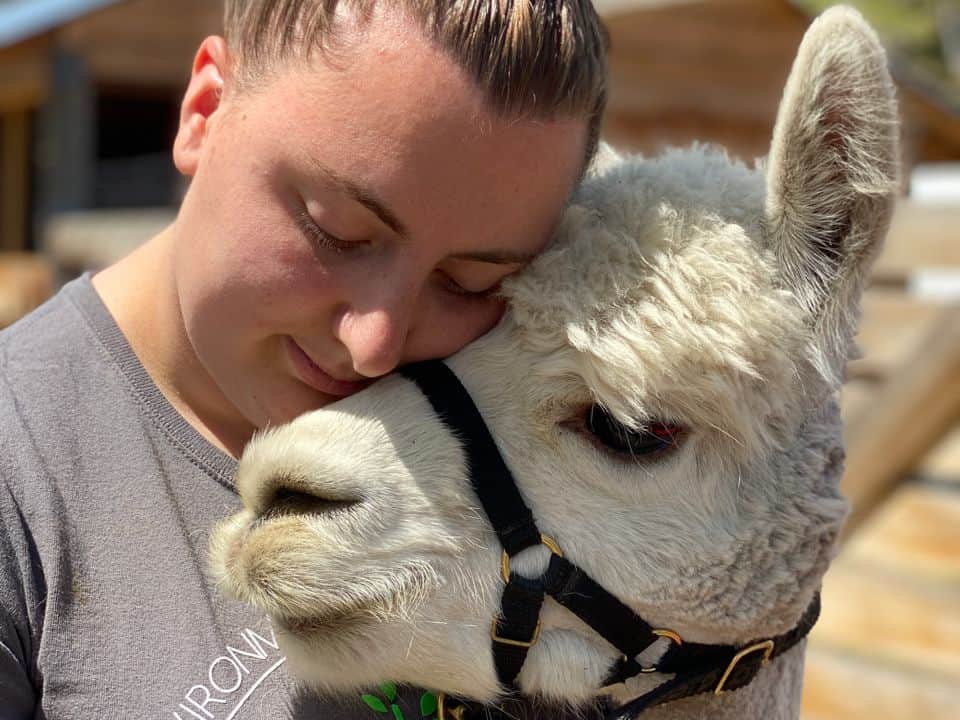
Photo Credit: Breanna Graham
- Alpacas are clean and intelligent.
- They produce fibre that is as fine as cashmere, soft, silky and much warmer and stronger than sheep's wool.
- Alpacas come in variety of colours, including white, black, brown, grey, fawn and any combination of these colours, the widest assortment of colours of any fibre bearing animal
- Alpacas are indigenous to the High Andes of the South American countries of Peru, Bolivia and Chile.
- Qualify as Livestock and as such may offer tax advantages and incentives.
- Are ideal for Hobby Farms and small acreages since 1 acre of productive pasture can sustain 5-8 animals.
- Alpacas are quiet, peaceful animals and make soft humming sounds to communicate.
- Alpacas are easy to raise, can be handled by anyone and are safe around children.
- Alpacas are extremely hardy and adaptable to most climates, elevations and conditions.
- Alpacas get along with goats, sheep, donkeys, horses, cats and family dogs.
- Alpaca adults weigh an average of 125 to 175 pounds. They live 20 – 25 years.
- Alpacas require little space. 1/8 of an acre is fine for one alpaca, if rotational grazing is practised. A 4-foot field fence makes a sufficient enclosure.
- Are suited to pasture on marginal land.
- Alpacas eat 2 pounds of hay per day and 0.75 of a pound (around a cup) of a supplement per day.
- Female alpacas are usually first bred at 18 months of age. Their gestation period averages 11½ months. Males are usually ready to breed between 2 and four years of age.
- As a rule, give birth during the day, usually between 10:00 AM – 2:00 PM.
- Alpacas make cleaning the corral an easy task, as they "go" in only a few spots.
- Alpaca droppings are practically odourless and are excellent for enriching soil.
- Alpacas are easily transported in a pick-up, van or trailer. They usually lie down in transit.
- Alpaca shows and competitions can promote a single alpaca or an entire herd.
- Alpacas have a high aesthetic appeal.
- Alpacas very rarely spit at people – usually only when nervous or overexcited.
Raising Alpacas, a rewarding Lifestyle
Alpacas offer a lifestyle with benefits and opportunities for the whole family. Relaxation, fun and a source of income are the rewards of raising these endearing animals.
Raising alpacas is an investment available to many.
Empty-nesters looking for a rewarding activity with income potential, high income earners looking for tax advantages and incentives, the established farmer looking for diversification, Hobby Farmers looking to make lucrative use of land and busy professionals looking for an outlet to daily stress. Families with children will appreciate how easy they are to handle. The harvesting of the fleece has inspired many to start cottage industries, processing the fibre of their own animals themselves by spinning it into yarn. If this involvement is not desirable, other fibre mills and the Canadian Camelid Fibre Co-op offer processing services.
City dwellers can board their animals at many established alpaca farms, building their herd until they wish to become more hands-on. Alpaca breeders from all walks of life interact with each other by participating in shows and open houses and by sharing their acquired expertise. This common interest and support has been the start of many friendships.
Raising alpacas is a labor of love. The escape from a fast-paced urban lifestyle to the quiet, pastoral surroundings of raising and breeding alpacas is a prescription for healthier, less stressful living!
